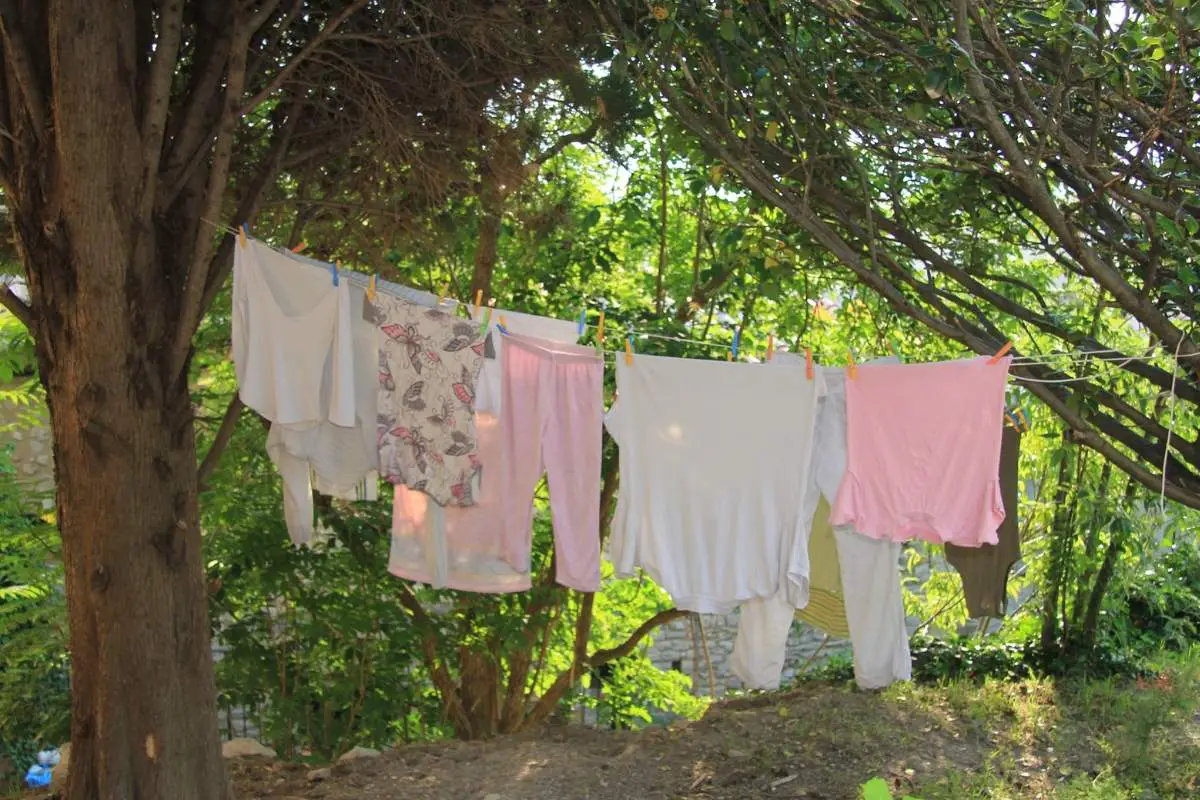The ten best money-saving tips for large families, from my friend Jen, an experienced mom of ten.
Is it just me, or are you fascinated by huge families? I’ve always wanted to have one or be part of one in some way. One of my closest friends has ten kids, ranging from 1-18. Her husband doesn’t have a super high-paying job, and I’ve always wondered how they made it work.
So I decided to be weird and ask her to do a little interview with me and share her frugal living tips. Let’s explore how she saves money as a mom of many.

1. Buy high quality, basic clothes
I was definitely expecting some advice about going to thrift stores to buy clothes, but Jen says she doesn’t recommend this at all.
“I don’t have time for thrift stores, and I don’t want to buy something that’s halfway through its life when it needs to last so long” she explained. Interesting.
Jen recommends L.L. Bean and Lands End for kids’ clothing and says that her kids have very basic clothes: a few pairs of jeans, nice church pants or skirts, and enough t-shirts, underwear, and pajamas to last a week.
There are a few exceptions to her high-quality rule:
- If her children need things that won’t be used frequently, like water shoes for a special trip, she buys a cheap pair.
- If someone wants a “fun” t-shirt, that’s fine too, but it will be given as a gift, not considered a necessity.
- Hand-me-downs will sometimes be saved for play clothes to keep nicer clothes in good shape. But, she warns that these can just become clutter and only save 1-2 outfits per child.
2. Meal plan for every meal and snack
Meal planning is a great idea for everyone, but it’s essential for a large family. There’s no rummaging through leftovers to feed twelve people. And if you think three kids yelling their lunch requests at you is too much, don’t even think about ten. You better know what you’re making ahead of time.
Jen explains that this is actually not as overwhelming as it seems. She plans dinners once a month and then has a repeating breakfast, lunch, and snack menu.
For example:
Mondays are scrambled eggs and toast for breakfast, peanut butter sandwiches and apple slices for lunch, and cheese and crackers for snacktime.
Every day is planned like this and it repeats. Occasionally, she will change things up with the season.
3. Make everyone help around the house
This was actually the first thing Jen mentioned to me, and I thought she had misunderstood my question. No, I was asking about frugal living, not time management for large families, I explained.
She understood the question and explained to me that everyone helping does save her money. She can’t do all the work herself: the cooking, cleaning, and general home management of a large family is impossible for one person.
But that doesn’t mean you need an expensive maid or to resort to takeout night after night. Nope. Everyone is expected to pull their weight, and sometimes even more than their weight. She explained that a large family could save money easier than you think: an older child can start dinner while mom is busy,
She said that when her family was smaller and had only little children, she spent more money out of boredom or frustration because she felt overwhelmed and alone. Helpful children are her best money savers.
4. Manage expectations
Jen said that so much advice about the frugal life does not apply to her. Giving up lattes and clipping coupons will get her nowhere because she is dealing with big numbers and many people, not silly luxuries.
For her family and many big families, sacrifices are necessary.
She explains that her children grow up in the warmest, most loving home imaginable. They have everything they need, a great relationship with their siblings, and a beautiful atmosphere. But there are things that they can’t afford to give their children, and everyone in the family understands this.
Some expensive items that they have said no to:
- Cell phones for younger teens
- Paid-for private college
- Multiple extracurricular activities per child
- Cars for older teens
- Brand names for almost everything
- Out of season fresh fruit (besides bananas and oranges)
Jen’s children are allowed to have these things, she says. But she can’t pay for them. Her children are welcome to get part-time jobs or earn small amounts of money around the house. Yes, there are times her children feel different from her peers and wish they had more gadgets. But she says her oldest two children have saved up for a gaming computer and an affordable car. They don’t feel deprived; they just have to work harder than their friends.
5. Buy food in bulk
Everyone wonders about the grocery bill for larger families, don’t they? And yes, Jen’s is big. She spends $1500/ month on groceries, and they also have a large garden and chickens for eggs and meat.
Buying in bulk seems obvious and necessary, and it really is. But Jen explains the real key isn’t buying enormous packages of chips but buying affordable food and a lot of it.
Some of her pantry staples:
- flour
- oats
- rice
- beans (dried are much more affordable than canned)
- bulk sacks of potatoes and onions
- block cheese (she says this stays fresher in the freezer, and she grates it as needed)
- all kinds of sugar
- sour cream, cream cheese, and plain yogurt
- cream and milk (she freezes these and says she never has any trouble)
- toilet paper, paper towels, and basic cleaning supplies
Jen shops almost exclusively at Costco. Don’t you miss all the different choices at the local grocery store, I wondered? The ice cream flavors? The new kinds of cereal?
But she doesn’t buy any of that.
6. Buy basic food and cook from scratch
This goes hand-in-hand with bulk shopping. My own family’s trips to Costco tend to be somewhat indulgent affairs, but not Jen’s.
No vacuum-sealed Alaskan salmon. We’re talking giant packages of ground beef. No bundles of instant Mexican rice. Just huge bags of plain rice.
Jen says to help her days flow more smoothly, she has a meal prep day to prepare taco meat, shredded chicken, cooked beans, and more. This lets her enjoy the ease of convenience food while still saving money. And yes, her kids help with this. They really are money savers!
They make their own ice cream if they really want it (it’s a few dollars in cream, milk, and sugar), and they never eat cereal. They’ll make homemade granola sometimes, but she says cereal is too expensive and not filling enough.
She buys plain yogurt and adds honey, chocolate chips, and other mix-ins.
At this point in our conversation, I wondered if she ever gets sick of all this food prep. Wouldn’t it be worth it, just for convenience, to buy stuff like little cartons of yogurt and shredded cheese?
But Jen swears it’s not hard. She says her kids do so much that it’s helpful she feels like she has it pretty easy.
7. Make a realistic budget
Ah, budgets. Yuck.
For a large family living a frugal lifestyle, a budget is a must. But, Jen says, the key is that it has to be realistic. We already discussed how she spends $150/ month at Costco. She knows that sounds like a lot, and a smaller family might think that sounds crazy. But she says she tried to budget a smaller amount and always spend more. So, it’s better to be realistic with yourself and know that that is a large monthly expense.
Frugal living doesn’t mean life is free. She still wants her kids to eat good food, wear nice things, and do activities that cost money.
Big grocery bills and other expenses are just a fact of life for her family size. Accept it and work with what’s left.
8. Take good care of your health
The first thing Jen mentioned in the personal care category was teeth: specifically, cavities. She said she has been super strict about toothbrushing with all of her kids. Sure, great teeth are nice, but really, can you imagine the cost of a few cavities per child when you have ten of them?
Her kids have had their share of broken bones, sports accidents, and even more serious medical issues. But minimizing doctor’s visits is very important to her, and everyone understands that being healthy is important in their family for several reasons.
9. Look for cheap entertainment
If Jen can find a fun place with a family plan for one price, she will almost always get it. They have family memberships to a bounce house, their local pool, and a bowling alley.
She feels that they get so much value from unlimited family plans that it’s worth it. She can spend money once, and after that, it’s basically free entertainment.
Jen also looks for free kid days at aquariums, amusement parks, and anything else that will make a fun day trip.
As far as keeping everything entertained while they are home, she’s a big believer in the library. They go every week, pick out a few favorites, and everyone has a quiet reading hour every day to enjoy their new books.
Her final tip? Pay older kids to watch younger kids, even when mom is home. She often pays them in privileges, such as screen time or a ride to go somewhere they want, instead of spending more money on babysitting.
10. Embrace having less
This one didn’t surprise me because my friend is one of the most content people I know. She has never longed for designer clothes, a fancy house, or expensive vacations. Or at least, she’s never shown it.
Jen said that not wanting those things isn’t just about accepting them as part of frugal living. She really embraces minimalism and thinks her life is better for having less in it.
“I already have a lot,” she explains. “And I don’t mean a lot of love, but a lot of actual stuff in my house. I don’t really understand why I would want more, no matter how pretty it is. I always wish I could get rid of more things, actually.”
It’s like her life is so full that there’s no room left for wanting things.
Large families can really teach all of us a lesson about saving money.
This conversation with my friend got me wondering if she is gifted with frugality or if managing such a large household helped her learn so many great money-saving tips.
My biggest takeaways from this were not being afraid of hard work, living differently from others, and making your family pitch in.

